1
Celebrating our women in water and sanitation
The contents of this publication do not necessarily reflect the views and policies of the Water Research Commission, nor does mention of trade names or commercial products or services constitute endorsement or recommendation.
© 2016 Water Research Commission
All rights reserved. No part of this publication may be reproduced or transmitted in any form or by any means without written permission of the copyright holder.
Author: Masanda Peter
Design, layout and typesetting: Anja van der Merwe Printed in the Republic of South Africa
2 HER STORY
Contents
Foreword by the Minister of Water and Sanitation
Remarks by Deputy Minister Pamela Tshwete
Introduction Cindi Joyce Sihle Mologadi Baloyi
Dr Thandi Ndlovu
Stella Mashego
Lizzy Relebohile Aaron
3
Celebrating our women in water and sanitation
10 12 14
4 5 6 7 8
This year marks 60 years since the women of our country, coming from all corners of the country and united in their diversity, marched on the Union Buildings to demand an end to a system that undermined their dignity and rights as citizens equal to their male counterparts.
These women placed their lives at risks against a system known for its brutality and zero-tolerance to dissent in order to guarantee that any future government founded on the principles of human rights and equality would appreciate and respect the role women could play in national unity and development.
As the department, we are inspired the by courage and resolve of those thousands of women who stood to be counted and added their names to history in pursuit of freedom for women and for all. The Women Incubator Programme of the Department of Water and Sanitation is an attempt by ourselves in the water family to ensure that we create opportunities for women to participate and become providers in the provision of water and sanitation services to our communities.
This programme is aimed at introducing womenowned entities into the water and sanitation industry as consultants, contractors, suppliers and innovators. This programme is aimed at creating set asides for women in the water-sector to ensure that they too may benefit from the huge economic benefits that accrue from water and sanitation infrastructure development and maintenance.

Through the programme, we hope to transform the
Foreword by the Minister of Water and Sanitation
Minister Nomvula Mokonyane Department of Water and Sanitation
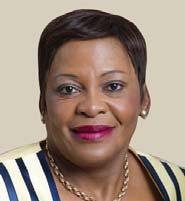
sector by ensuring we empower women to deliver the services and not merely become beneficiaries of water provision and decent sanitation.
Specifically, the programme is targeting three cohorts: beginners (women-owned enterprises in business, however, with no sustainable growth); intermediates (women-owned enterprises in business which are not established as big enterprises yet); and established (women-owned enterprises at intermediate stages that function as fully-fledged business but which require additional support to take their businesses to the next level of operation to compete more successfully nationally and internationally).

The programme is made up of three projects:

• Women in water entrepreneurship incubator






• Mentorship
• Women in water forums












We are moving ahead swiftly to ensure that we remove barriers and industry obstacles that impede our efforts to transform the water sector. This initiative is one such programme that is revolutionary and designed to empower women of our country, and most importantly, to further create new economic opportunities for the previously disadvantaged in order to push back poverty and joblessness.
We wish all those identified to participate in the first intake of entities well and confirm that we will place all possible support to ensure that we positively propel them to succeed within the water sector.
4 HER STORY
We are gathered here today to bring to fruition the ideal of women entrepreneurs taking active part in the water and sanitation sector. This is a realisation of the ideals of this current female leadership of the Department of Water and Sanitation.
The idea behind this ideal is to break through the male domination of the sector, bringing the major users of the water and sanitation services into the forefront of delivery of these same services.


Women and girl children form the largest part of the population of our country. It is therefore most logical that those that are to be served should be the ones at the forefront of ensuring the requisite services are realised.
When we held the Women’s Consultative Conference two years ago and indicated our intentions it seemed like a dream. I must say we are most encouraged by the progress that we have achieved in this stead. Whilst these are still baby steps, there is a realisation that the need to revitalise and rejuvenate the sector must be led by the women themselves.
If truth be told, women are very active participants in the South African economy. We are aware of those that have been in leadership roles in different sectors like banking, mining, and so many other sectors. It is now about time that this very critical
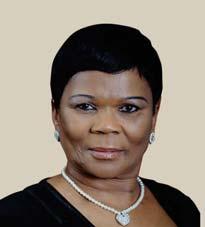

Remarks by Deputy Minister of Water and Sanitation





 Deputy Minister Pamela Tshwete Department of Water and Sanitation
Deputy Minister Pamela Tshwete Department of Water and Sanitation
sector has to have active players to ensure the correct services are delivered correctly, ensuring that our women, mothers and girl-children benefit, more so timeously.
This women-led basic services delivery Department and Ministry are keen to have women-led enterprises gaining the necessary skills and experience to proudly take us into the next decade, and ultimately into the next century and beyond; showing to the world what the African woman can achieve.


our women in water and sanitation










Celebrating
5
Introduction: Women-owned enterprises
In the past seeing women, especially black women, involved in water and construction projects was inconceivable. When the current Minister of Water and Sanitation was the MEC of Housing in Gauteng she launched a project which saw women entrepreneurs getting a foot in the door and operating in the male-dominated space of construction.
This initiative saw the department working with game changers; women who are working on big projects and doing great work by producing great results at these projects and finishing their projects in record time and setting the bar high. At the May 2016 Water and Sanitation Budget Vote; The Honourable Minister Nomvula Mokonyane mentioned plans to expand the water family:
“The South African water industry is too small, and dominated by the traditional players. We want to both expand and diversify this industry. The Water Research Commission (WRC) has been tasked to expand their technology assessment programme to assist new entrants into the water and sanitation sector.”
The involvement of women in this sector bears testimony to that expansion as we look at the success stories of women.

6 HER STORY
Cindi Joyce Sihle of Maunga Projects
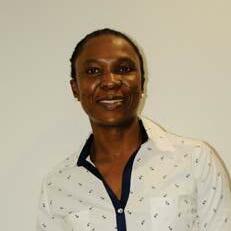

















Cindy Joyce Sihle grew up in Alexandra township and completed her schooling there. She was raised in a middle-class family with eight siblings.
In 2004, she started a small construction company with her husband. “It was not an easy journey, but I wanted to do something with my life and I wanted to be somebody”, she notes. At some point a family friend assisted them financially as they experienced cash flow challenges. He also showed them what to do in order to succeed. Giving up amid all of these challenges was not an option for Cindy.
Through the initiatives driven by the Department of Housing they were guided and shown the different ways of staying ahead in the business world. The business has now grown and they have been involved in projects nationally and are not only Johannesburg based anymore – they have worked in projects as far as KwaZulu-Natal and the Eastern Cape. Being a Level 8 business means the company has the capacity to work on bigger projects, and Cindi and her husband have aspirations of growing the company to a Level 15. She plans to work harder so that the business can grow bigger.
Cindi can look back on her work with pride. While Government opened the door, she had to work
hard to complete all of her projects successfully despite some challenging times.
Reflecting on the anniversary of the Women’s March to the Union Buildings in 1956 Cindy is grateful that those women paved the way to allow her to be where she is today, especially as a woman. She is determined to grow her business and contribute to her community.
As a working woman she tries to find balance between being a business woman, being a mother and being a wife. In her spare time Cindy loves to spend time with her children. Her advice to women, especially young women who want to enter the construction business, is that they should learn to work for themselves and push hard. They need to be brave and know what they want. “It’s a tough industry and sometimes getting the right people is not easy. Women need to stand up on their own,” she concludes.
“It’s a tough industry and sometimes getting the right people is not easy. Women need to stand up on their own.”




Celebrating our women in water and sanitation 7
Mologadi had set her plans on becoming a lawyer but a teenage pregnancy stopped her dreams of following a Law Degree. Her mother told her that she was not to continue her studies because she had a baby to take care of, but at least she managed to complete her matric.
At that time her world came falling down as she was disappointed that she could no longer continue with her studies. Later on in her life this decision turned out to be a blessing in disguise. She started selling vegetables and fruit to make ends meet. Mologadi then later worked as a clerk but still did not stop selling fruit and vegetables. In 1994, she was approached by a local hospital to supply the vegetables and later was asked to supply meat. That was another business that grew her entrepreneurial spirit.
She later got married and she and her husband opened a butchery business. At the same time she also worked as a clerk. In 1999, she left decided to focus on her business full time. Minister Stella Sigcau is one of the Ministers who gave her a break as she invited women to come into the construction business and she was part of that delegation. Nine months later she acquired 4 projects and she has not looked back since then.
In 2005, Minister Nomvula Mokonyane invited women to be part of the construction sector and

Mologadi Baloyi
of




















Mologadi A Nape Business Enterprise
to assist with building RDP houses around Gauteng. This was a huge turning point for Mologadi A Nape Business Enterprise. The turning point was not to come without its challenges. “I needed serious money in order to start with the work and I approached some banks”; she adds. She managed to get projects on water and on building roads, but her main projects were on water projects.
She had several challenges to deal with as a business women, from handling theft of material on-site to being given sub-standard material by building suppliers. She also had challenges in her private life to deal with.
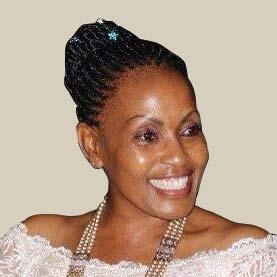
Overcoming these challenges resulting in growing the company to become specialised in roads and water-related infrastructure. According to Mologadi, her secret to success is surrounding herself with experts. The company currently employs 46 fulltime staff members and has offices in Gauteng, Limpopo, Cape Town and the Eastern Cape.
Mologadi’s business success also comes from having sharp business acumen. She uses her finances wisely and understands that the money she gets from the business needs to be invested back into the business and is not money to be used to buy flashy cars. She earns a monthly salary from the business like all her employees. Mologadi is also giving back to her community; every year she builds
8 HER STORY
“The Minister believed in us as business women, hence we are where we are today.”
two houses for child-headed households or single mothers. This is her way of making a difference to the community she comes from.
She commends Minister Nomvula Mokonyane for the contribution she has made in her life. “Nomvula has made us who we are today,” she says. “The Minister believed in us as business women, hence we are where we are today.”
Mologadi is a mother who likes travelling in her spare time but mostly relaxes at home. Her message to other business women is that they should respect the people they work with; one should not bully people because they are successful.
Her motto in life is to trust God in everything and every day she prays to keep jobs alive. She aims to empower the next person. “We are not here to take everything,” she concludes.

Celebrating
9
our women in water and sanitation
Once Dr Thandi Ndlovu decided to swap her stethoscope for the boardroom there was no stopping this dynamic business women from making her mark on the construction industry.
Born and educated in Soweto, Thandi was heavily involved in politics, and at the height of the Soweto student uprising in 1976 she was serving as the Administrative Secretary of the Student’s Representative Council (SRC) at the University of Fort Hare. She was forced to abandon her Bachelor of Science (BSc) degree as a direct result of the oppression that followed. She spent the next couple of years in training within the ranks of Umkhonto we Sizwe – the African National Congress Military Wing. In 1984 she resumed her studies at the University of Zambia, completing a BSc (Human Biology) and MBchB degrees.
. Women have various roles to play as mothers, sisters and community leaders. As someone who has learnt a lot of life lessons, she believes in being a role model to a younger generation of women, just like the women she has had in her life, and who have made an impact on her.
“Appreciate the fact that for that little girl in your space to make it, you have to act as a role model and a girl,” is Thandi’s advice to other women. “Whatever you do, develop that little girl that is
Dr Thandi Ndlovu
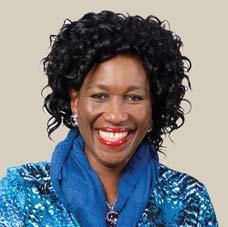
of Motheo Group





















in your space, family, environment, community and in other areas. When I look back, I realise that it was those role models I had around me who made me what I am today.”
Upon her return to the country after the unbanning of political parties, she opened a private medical practice in Orange Farm. After practicing for a few years she decided to go into business. The Motheo Construction Group was established in 1997. During its 18-year history the firm has developed into one of South Africa’s leading, predominantly black female-owned construction companies.
The company name, Motheo, means Foundation is Sesotho. “This was a foundation of a new me in business,” Thandi explains the origin of the name. She made a deliberate decision to employ women in her company. “When I set off in business I made a conscious decision to set up a business that is women owned, women managed and black owned. I will look for other women to be shareholders in this business. I will look for women who are technically competent”.
“They say it takes 20 years to develop a good engineer and a good quantity surveyor, my girls have taken less than ten years. They are very good engineers, they are very good quantity surveyors,” notes Thandi. This is thanks to her decision to
10 HER STORY
“Whatever you do, develop that little girl that is in your space, family, environment, community and other areas. When I look back, I realise that it was those role models I had around me who made me what I am today.”
pair her young contractors for established, white engineers and so induce the necessary mentorship and training.
Thandi’s determination can be seen not only from the way she handles her business, but also in the way she handles her personal life. Being asthmatic didn’t stop her from reaching the summit of Kilimanjaro. She highlights that women need to refocus their energies on things that really enhance their value as a woman. “The value that they are an asset, their own asset, and to understand that at the end of the day, black sister you are on your own.”

Celebrating our
sanitation 11
women in water and
Stella Mashego
 of Ntsangalala Business Enterprise
of Ntsangalala Business Enterprise





Stella was originally a teacher but left the profession in 2006 to enter the business world.



In 2010, she decided to venture into construction after spotting opportunities within the sector. While she was a teacher she was offered a bursary to study Computer Science. This opened up her world to wider opportunities than teaching. She became hungry for the opportunities the world could offer. After resigning from teaching she applied at the Department of Labour where she was offered a project to train early childhood development practitioners. That was the start of her business career. Following the conclusion of that project she searched for more opportunities and started working on road maintenance projects. She started off as a Level 1 business. Her business has now grown into a Level 8.
Her first project cost R4 million, and as she grew with her experience she started getting bigger projects. Her most ambitious project to date has been the successful construction of a bridge in a contract worth some R60-million.
In her business she employees 600 staff members, including 12 engineers who work on various projects around the country. Her clients include Rand Water and Bushbuckridge Municipality. The name Ntsangalala means expansion; and that is
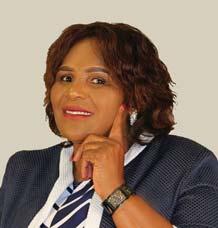
exactly what she has been experiencing.








In the meantime Stella has expanded her business to include water projects, such as transporting water from reservoirs to the communities and so ensuring that communities are getting water. Stella feels that women have carved out a strong position in the construction sector, especially thanks to Government initiatives such as those initiated by Minister Nomvula Mokonyane. “The industry used to be male-dominated in the past but women have proved that they can also produce good quality and are skilled managers.”
Stella has had her fair share of challenges in the business. One of her initial mistakes was not being able to price correctly. This ended up in her making a loss.




To women who want to enter the water and construction business she advises to be hands on and to learn as much as they can about the business. “People should not only be excited about getting projects; they need to learn about the business and ask questions so that they can also gain knowledge.”
Stella is not only a business woman. She is also a pastor in her community. She has also donated three houses to date. Some of her church members
12 HER STORY
“The industry used to be male-dominated in the past but women have proved that they can also produce good quality and are skilled managers.”
are employed in her business. She also offers bursaries to students. Through her business she has also built five churches.
A mother of four, Stella describes her husband as supportive of her – a man who allows her to be who she is meant to be. She counts minister Mokonyane and ANC stalwart, Winnie Mandela, among the people who inspire her.

Celebrating
13
our women in water and sanitation
Lizzy grew up in Sebokeng. After high school she went on to study for a Human Resources qualification at what was the Witwatersrand Technikon (now part of Johannesburg University). She spent a few years in the corporate environment gaining some experience. In 2003, she entered the business world. At that time were not a lot of women in the construction world. She started off by supplying industrial equipment to mining companies as well as supplying personal protective equipment. A year after starting her own business she fully entered the construction industry.
She faced a few challenges in the business. She found men not wanting to take her or her business seriously and, initially, funding was a challenge. She is glad to say that things have improved since then. She attributes this to her hard work and success in handling complex projects. This helped improve her image and made men in the business see her as their equal.
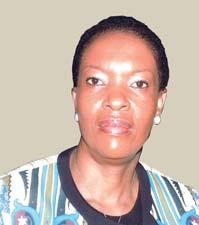
Lizzy has stayed in the game for so long because she has passion for the business and wants to succeed. As much as the business is doing well; she has experienced low moments with late payments which would leave her compromised especially
Lizzy Relebohile Aaron
of L&R Welding and Tool Supplies





















when it comes to paying her 100 employees. It is such moments where she would think of going back to the corporate environment and not worry much about the business but she would be reminded of the 100 families and beneficiaries depending on her and relook her decision.
In 2005, she was selected by the MEC of Housing as a beneficiary of a project aimed at empowering and mentoring 10 women contractors in construction. Through the programme she received a R9 million project, which boosted her business tremendously. Today she runs a Level 8 business.
Lizzy relates how her mentor, who had to go into exile during the apartheid years, made her feel while relating her story. “We are grateful for the bravery of those women. The women of 1956 paved the way because now we see women in construction as today we have women who soldier on and take challenges in their stride.”
Her advice to women wanting to enter the sector is to not give up.
Lizzy takes pride in giving back to the community. “We want to leave a legacy and we want to be
14 HER STORY
“We are grateful for the bravery of those women. The women of 1956 paved the way because now we see women in construction as today we have women who soldier on and take challenges in their stride.”
remembered after we leave an area.” She has built houses for orphaned children, and every year she takes the elderly out for excursions in partnership with a local church. She also provides bursaries to deserving university students.
Her motto is “Today is a new day and I am up for it”

Celebrating
sanitation 15
our women in water and
WATER IS LIFE - SANITATION IS DIGNITY


16 HER STORY


































